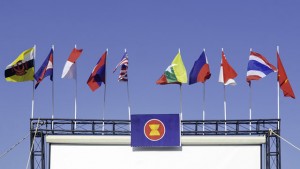Home » Commentary » Opinion » In praise of Southeast Asia’s miracle
· Ideas@TheCentre
 If you didn’t notice that this week marks the 50th anniversary of the founding of the Association of Southeast Nations (ASEAN), don’t worry: most Australians didn’t either. But ASEAN’s milestone is worth celebrating, because its record shows how developing nations prosper from embracing free trade and free markets.
If you didn’t notice that this week marks the 50th anniversary of the founding of the Association of Southeast Nations (ASEAN), don’t worry: most Australians didn’t either. But ASEAN’s milestone is worth celebrating, because its record shows how developing nations prosper from embracing free trade and free markets.
ASEAN was born on August 8, 1967 amidst war, poverty and the threat of communism. Today, much of Southeast Asia is at peace; living standards have grown at an astounding rate; and communism is a bad memory everywhere but Vietnam where it’s fading fast.
Never has so much wealth been generated across the region and never has it been shared more evenly. More than half of ASEAN’s 640 million people enjoy middle-class status with rising purchasing power.
That prosperity is due not to the edicts of governments, but to the co-operations of millions of people — rich and poor — through free trade and foreign investment. As a result, health has improved and life expectancy has increased dramatically.
Kishore Mahbubani — one of Asia’s most distinguished intellectuals (and a former guest of the Centre for Independent Studies) — tells the story in his recent book The ASEAN Miracle: A Catalyst for Peace, co-written with Jeffery Sng.
When he was Singapore’s UN ambassador in the 1980s, he witnessed ferocious debates between the America-led free marketeers and those opposed, led by the Latin Americans. Major developing economies, notably India, would sing the anti-capitalist tune. Foreign investment was spurned.
Mahbubani, the lone voice among the so-called G77 bloc at Turtle Bay, recalls how the Singaporean delegation was “brave enough to walk into the lion’s den of G77 meetings and defend the virtues of foreign investment… and free enterprise.”
The upshot is that Singapore’s bold decision to swim against the dominant protectionist current — and its early success with free markets — has had a catalytic effect on the rest of Southeast Asia. So three cheers to ASEAN.
In praise of Southeast Asia’s miracle